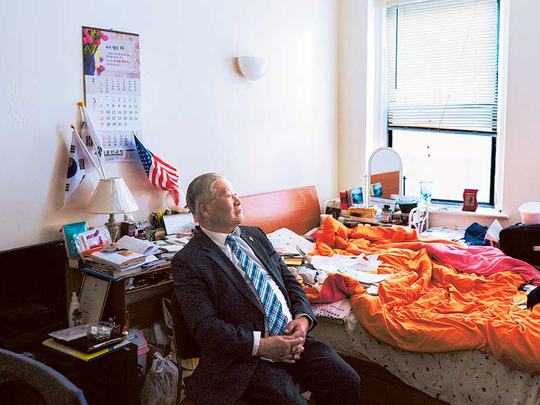
NEW YORK: Han Tak Lee, 81, spends much of his time alone in a small room in Queens. It is a ground-floor studio apartment with a kitchenette and a bathroom, right beside train tracks used by the Long Island Rail Road. Commuter trains roar by every so often, though the double-glazing of his windows reduces the noise to a gentle whoosh.
His cramped living situation begs a comparison to the way he spent most of the past quarter-century. From 1990 to 2014, Lee was locked away in a series of prisons in Pennsylvania, serving a life sentence for murdering his daughter in a fire. Two years ago, however, a judge exonerated him and ordered him freed after determining that his conviction was based on theories about arson that had later been discredited. An appellate court upheld the ruling in August.
Yet Lee, a free man now, still seems bound by his imprisonment. The experience weighs on him as he reckons with his past and considers the final stretch of his life. He admits to feeling bitterness.
“I still think it’s totally unfair that I had to serve 24 years in prison,” he said in an interview. “I’m innocent.”
He has been surviving on Social Security payments and, more so, on the largesse of people who have sympathised with his plight. A support group that formed while he was in prison raised tens of thousands of dollars to help with his legal fees and, after his release, to help pay for his rent and living expenses. But that fund has nearly dried up, and Lee recently contacted Ron Kim, a Democratic state assemblyman, seeking assistance in finding subsidised housing.
“He wants to live with dignity for the rest of his life,” Kim said.
Though in his ninth decade, Lee, a Korean immigrant who became a naturalised American citizen, is not confronting the challenges of his current circumstances with anything resembling meekness.
He is angry at the justice system for locking him up and taking so many years of his life. He is resentful toward his ex-wife, who divorced him while he was in prison. He is estranged from his surviving daughter and her family, he said. He has accused the leadership of his former church of not sufficiently coming to his defence when he was being investigated, even as the church raised about $80,000 (Dh293,840) over the years to help pay for his legal representation. And he has alienated some of his most ardent supporters.
Chris Chang, the spokesman for the support group, said the prison experience had left Lee suspicious of everyone and their motives, leaving him prone to sudden changes of heart. This unpredictability has led some of his supporters to keep their distance, friends said.
“Like a volcano,” Chang said.
Lee is unapologetic. “I recognise my personality, but that’s because of the many experiences I’ve had,” he said. “I am resolute. I am different.”
He added: “I was fully exonerated. It gave me the confidence to be more vocal.”
In two interviews with Lee at his apartment, he seemed mostly cheery and good-natured, patiently answering questions about his life in Korean and rudimentary English and laughing frequently. His mood darkened somewhat only when the conversation turned to the subject of his ex-wife and daughter.
“I don’t want to talk about my family,” he said sharply.
The fire that killed Lee’s daughter occurred in July 1989 at a religious retreat in the Poconos run by the church he attended at the time.
Tragic outing
Lee, who ran a clothing store and lived with his then-wife and two daughters in Sunnyside, Queens, had taken his oldest daughter, Ji Yun, to the retreat at the urging of the church’s pastor. Ji Yun, who was 20 and an art student at Pratt Institute in Brooklyn, had severe mental illness. He hoped the trip would help her.
Early one morning, a fire broke out in their cabin. Authorities found Lee sitting stoically outside the burning cabin with two packed bags, the ABA Journal, a publication of the American Bar Association, reported in an article about the case. His behaviour, deemed strangely passive by investigators, became part of the prosecution’s case against him. Ji Yun’s burnt body was found inside the cabin.
At the trial, prosecutors, citing the testimony of fire experts, argued that the charring patterns and glass fracturing indicated a deliberately set fire, and that the arsonist had started the fire in at least eight spots in the cabin using a mixture of home fuel oil and another accelerant, according to news reports. One expert witness said a chemical analysis of Lee’s clothes suggested a link to a plastic glove and a jug said to have been used to pour the fuel.
In defending Lee, his lawyer argued that Ji Yun had set the fire herself. Lee said he had been asleep when the flames broke out and had unsuccessfully tried to rescue his daughter.
The jury sided with prosecutors, and he was convicted of murder and arson and sentenced to life in prison.
His case became a cause célèbre among Koreans in the United States, and his trial was closely followed in South Korea. After his arrest, members of the Korean population in New York formed the support group, called the Free Han Tak Lee Committee, and in the ensuing years raised money to help pay his legal fees.
Lee said he was very isolated in prison, keeping largely to himself and living for years in his own cell. He never encountered another Korean during his time behind bars, he said.
In 2014, a magistrate judge in Harrisburg, Pennsylvania, found that long-held beliefs about the science of fire, which were at the core of the prosecution’s case, had been discredited. A federal judge adopted the magistrate judge’s recommendation that Lee’s conviction and sentence be vacated, and Lee was released. Prosecutors unsuccessfully appealed the decision.
Pennsylvania does not provide compensation to people wrongly convicted of a crime, and Lee has not filed a lawsuit over his wrongful imprisonment.
Kim, the assemblyman, is working with community groups to figure out ways to help him. “I’m putting myself in his shoes and trying to understand about how he was able to cope with being locked away for so many years and to be back and finally have his freedom, yet is struggling to live with some sort of integrity,” Kim said. “There’s such a feeling of injustice.”
— New York Times News Service












